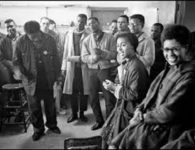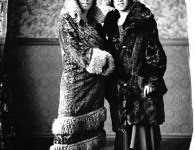Chester Himes is best known as a famous novelist during the Harlem Renaissance era. However, before he was a famous writer, he was a young criminal. His life changed abruptly after being arrested in Chicago.
One night in November 1928, Himes walked into the home of an elderly couple and later made away with their Cadillac, cash, and a handful of jewelry. But that night would not play out to be an easy breezy robbery; the car Himes was driving got stuck in the mud, he ended up walking hours to catch a bus heading west. He planned to pawn the jewelry at a shop owned by “Jew Sam,” which one of his friends had recommended.
Once he arrived at the pawn shop, however, the police were called, and Himes was arrested. At the station, detectives tied his feet together, handcuffed his wrists behind his back, and pistol-whipped him before turning him over to a Cleveland Heights detective. Himes was sentenced to a 20-years in the Ohio State Penitentiary. It was there he began his writing career while serving seven and half years. That career would be marked by hardship as well. Despite having these prison stories published in national magazines, once he was back on the street he had to make a living at such jobs as being waiter and sewer digger.
In 1945 he completed his first novel, If He Hollers Let Him Go, a story of racism in the workplace, but the book did not sell well. In a speech entitled “The Dilemma of the Black Negro Novelist in the United States,” he argued that black writers have no choice but to present truths that make both whites and blacks uncomfortable: “If this plumbing for the truth reveals within the Negro personality homicidal mania, lust for white women, a pathetic sense of inferiority, paradoxical anti-Semitism, arrogance, Uncle Tomism, hate, and fear and self-hate, this then is the effect of oppression on the human personality.”
He was not as well known or appreciated as most of his fellow distinguished writers like Gwendolyn Brooks, Toni Morrison, Langston Hughes, Richard Wright, and James Baldwin. His popular legacy rest solely on a series of detective novels, which follow the exploits of a pair of black police detectives in Harlem; that series spawned three movies, including 1970’s Cotton Comes to Harlem.
Source:
http://www.math.buffalo.edu/~sww/HIMES/himes-chester_BIO.html
https://en.wikipedia.org/wiki/Chester_Himes




















1 Comment
[…] Source […]